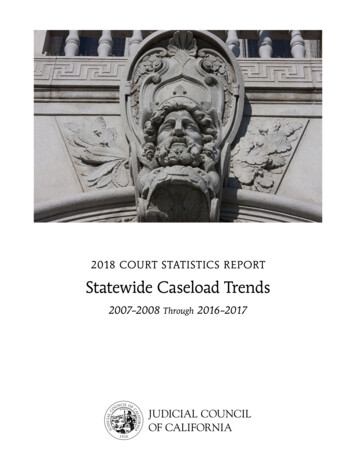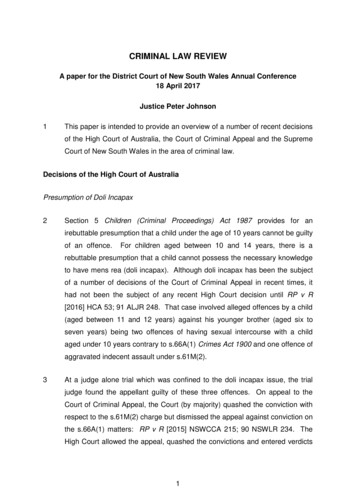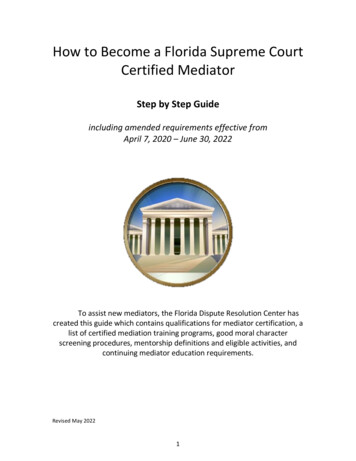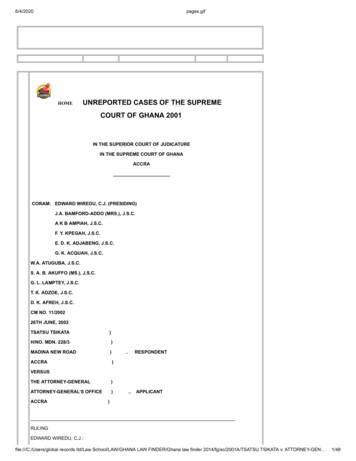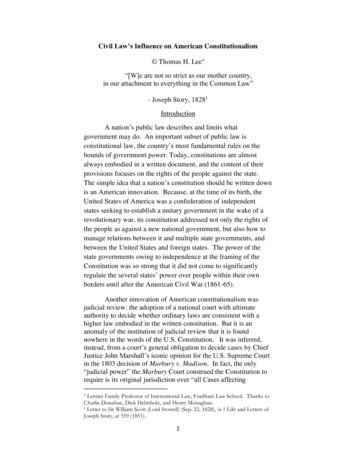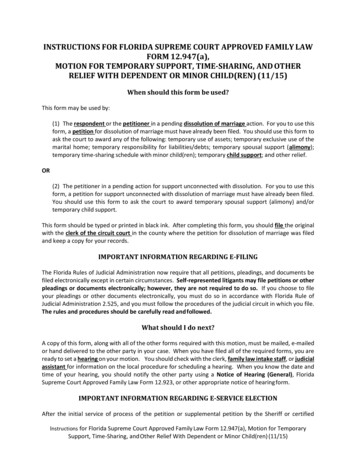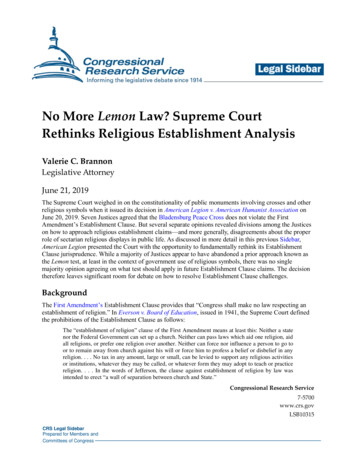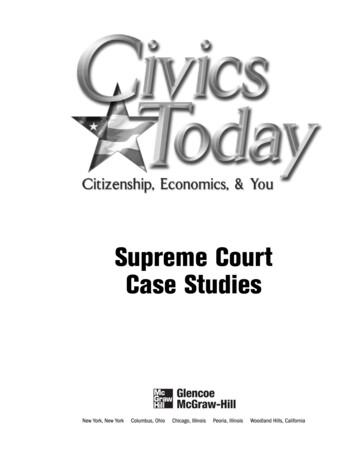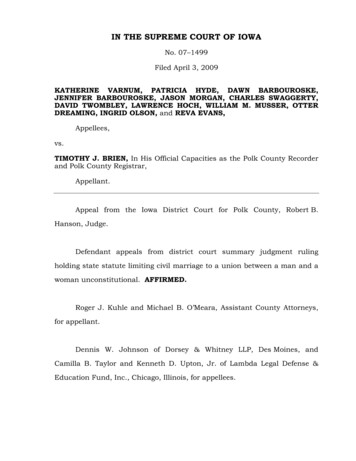
Transcription
IN THE SUPREME COURT OF IOWANo. 07–1499Filed April 3, 2009KATHERINE VARNUM, PATRICIA HYDE, DAWN BARBOUROSKE,JENNIFER BARBOUROSKE, JASON MORGAN, CHARLES SWAGGERTY,DAVID TWOMBLEY, LAWRENCE HOCH, WILLIAM M. MUSSER, OTTERDREAMING, INGRID OLSON, and REVA EVANS,Appellees,vs.TIMOTHY J. BRIEN, In His Official Capacities as the Polk County Recorderand Polk County Registrar,Appellant.Appeal from the Iowa District Court for Polk County, Robert B.Hanson, Judge.Defendant appeals from district court summary judgment rulingholding state statute limiting civil marriage to a union between a man and awoman unconstitutional. AFFIRMED.Roger J. Kuhle and Michael B. O’Meara, Assistant County Attorneys,for appellant.Dennis W. Johnson of Dorsey & Whitney LLP, Des Moines, andCamilla B. Taylor and Kenneth D. Upton, Jr. of Lambda Legal Defense &Education Fund, Inc., Chicago, Illinois, for appellees.
2JohnM.MurrayofMurray&Murray,PLC,StormLake;Paul Benjamin Linton, Special Counsel, Thomas More Society, Northbrook,Illinois; Paul R. Devin, Supreme Advocate, Knights of Columbus, New Haven,Connecticut; and Thomas Brejcha, President and Chief Counsel, ThomasMore Society, Chicago, Illinois, for amicus curiae Knights of Columbus.Norman L. Springer, Jr. of McGinn McGinn Jennings & Springer,Council Bluffs, Mathew D. Staver, Stephen M. Crampton, Mary E. McAlister,and David M. Corry, Liberty Counsel, Lynchburg, Virginia, for amicus curiaeLiberty Counsel.Michael J. Manno, West Des Moines, for amici curiae Jews OfferingNew Alternatives to Homosexuality, Parents and Friends of Ex-Gays & Gays,and Evergreen International.Jason M. Steffens of Simmons Perrine PLC, Cedar Rapids, andRoger T. Severino of The Becket Fund for Religious Liberty, Washington,D.C., for amicus curiae The Becket Fund for Religious Liberty.Andrew J. Boettger of Hastings & Gartin, LLP, Ames, and Steven W.Fitschen, Barry C. Hodge, and Nathan A. Driscoll of The National LegalFoundation, Virginia Beach, Virginia, for amicus curiae The National LegalFoundation.David James Hanson of Hofmeyer & Hanson PC, Fayette, andJoshua K. Baker of Institute for Marriage and Public Policy, Manassas,Virginia, for amici curiae James Q. Wilson, et al., Legal and Family Scholars.
3Timm W. Reid of Galligan, Reid & Galligan, P.C. and Iowa Liberty andJustice Center, Des Moines, and Benjamin W. Bull, Brian W. Raum andJames A. Campbell of Alliance Defense Fund, Scottsdale, Arizona, for amicuscuriae Iowa Legislators.Robert R. Anderson, Vinton, Stuart J. Roth of American Center for Law& Justice, Washington, D.C., Laura B. Hernandez of The American Centerfor Law & Justice, Virginia Beach, Virginia, and Vincent P. McCarthy ofAmerican Center for Law & Justice NE, Litchfield, Connecticut, for amicuscuriae The American Center for Law & Justice.Daniel DenBeste of Elderkin & Pirnie, PLC, Cedar Rapids, andMonte Neil Stewart of Marriage Law Foundation, Orem, Utah, for amicicuriae United Families International, Family Watch International, andFamily Leader Foundation.Michael A. Giudicessi, Christian S. Walker, Karin A. Johnson, andNicole Nayima of Faegre & Benson LLP, Des Moines; Michael A. Ponto ofFaegre & Benson LLP, Minneapolis, Minnesota; and Evan Wolfson, ExecutiveDirector of Freedom to Marry, New York, New York, for amicus curiaeFreedom to Marry.Randall C. Wilson of Iowa Civil Liberties Union, Des Moines, andJohn A. Knight of American Civil Liberties Union Foundation, Chicago,Illinois, for amici curiae The Bazelon Center for Mental Health Law, IowaProtection and Advocacy Services, Inc., National Council on IndependentLiving, and the National Senior Citizens Law Center.
4David H. Goldman, Brent A. Cashatt, and Kodi A. Petersen of Babich,Goldman, Cashatt & Renzo, P.C., Des Moines, and Suzanne B. Goldberg,Clinical Professor of Law and Director of Sexuality and Gender Law ClinicColumbia Law School, New York, New York, for amici curiae Robert C.Hunter, Jean C. Love, and Maura Strassberg, Iowa Constitutional LawScholars.Gordon R. Fischer of Bradshaw, Fowler, Proctor & Fairgrave, P.C.,Des Moines, and Hugh S. Balsam and Kara J. Bruce of Locke Lord Bissell &Liddell, LLP, Chicago, Illinois, for amici curiae Certain Current and FormerIowa Elected Officials.Ivan T. Webber of Ahlers & Cooney, P.C., Des Moines, andTobias Barrington hia, Pennsylvania, for amici curiae OneIowa; The Iowa Chapters ofParents, Families and Friends of Lesbians and Gays; The Equal JusticeSociety; The National Black Justice Coalition; The Mexican American LegalDefense and Educational Fund; The Zuna Institute; The Asian AmericanJustice Center; The Southern Poverty Law Center; People for the AmericanWay Foundation; The Asian American Legal Defense and Education Fund;and The Immigrants’ Rights Program of the American Friends ServiceCommittee.Harvey L. Harrison of Harrison & Dietz-Kilen, P.L.C., Des Moines, andMary Bonauto, Bennett H. Klein, and Janson Wu of Gay & ramicicuriaeMassequality, Massachusetts Gay and Lesbian Political Caucus, Gay &
5Lesbian Advocates & Defenders, various Massachusetts Senators andRepresentatives, Equality Federation, Garden State Equality, Love Makes aFamily, Vermont Freedom to Marry Task Force, Human Rights Campaign,Human Rights Campaign Foundation, and National Gay and Lesbian TaskForce.Catherine C. Dietz-Kilen of Harrison & Dietz-Kilen, P.L.C., Des Moines,for amicus curiae Iowa and National Faith Leaders, Communities andScholars.Charles E. Gribble and Matthew T. Oetker of Parrish, Kruidenier,Dunn, Boles, Gribble, Cook, Parrish, Gentry & Fisher, L.L.P., Des Moines,and Aderson B. Francois, Caroline Boucher, Amy E. Hatcher, and Damien G.Scott of Civil Rights Clinic, Howard University School of Law, for amicuscuriae Howard University School of Law Civil Rights Clinic.Mark E. Schantz of College of Law University of Iowa, Iowa City, andStephen Sanders and Jeffrey W. Sarles of Mayer Brown LLP, Chicago,Illinois, for amici curiae Iowa Professors of Law and History.Jim Quilty of Crawford & Quilty, Des Moines, and Vivian L. Polak,Jonathan A. Damon, Spencer R. Wood, Suman Chakraborty and Emily A.Gianquinto of Dewey & LeBoeuf LLP, New York, New York, for amici curiaeThe National Association of Social Workers, The National Association ofSocial Workers-Iowa Chapter, Youth and Shelter Services, and MiddletonCenter for Children’s Rights at Drake University Law School.
6Roxanne Barton Conlin of Roxanne Conlin & Associates, P.C.,Des Moines, Jennifer K. Brown and Julie F. Kay of Legal Momentum,New York, New York, and Laura W. Brill, Elizabeth L. Rosenblatt, andRichard M. Simon of Irell & Manella, Los Angeles, California, for amici curiaeWomen’s Rights Organizations.JosephM.Barron,Des Moines;RichardT.GreenbergofMcGuirewoods LLP, Chicago, Illinois; and Shannon Price Minter of NationalCenter for Lesbian Rights, Washington, D.C., for amici curiae Professors ofFamily Law and Jurisprudence.Amy L. Reasner of Lynch Dallas, P.C., Cedar Rapids, and Carmine D.Boccuzzi of Cleary Gottlieb Steen & Hamilton LLP, New York, New York, foramicus curiae Social Science Academics and Associations.Thomas A. Newkirk and Paige E. Fiedler of Fiedler & Newkirk PLC,Urbandale; Paul M. Smith, William M. Hohengarten, and Anjan Choudhuryof Jenner & Block LLP, Washington, D.C., and Nathalie F.P. Gilfoyle ofAmerican Psychological Association, Washington, D.C., for amicus curiaeThe American Psychological Association.Daniel L. Bray of Bray & Klockau, P.L.C., Iowa City, and Diana E.Richmond of Sideman & Bancroft LLP, San Francisco, California, for amicicuriae The American Academy of Matrimonial Lawyers, Joan and LyleMiddleton Center for Children’s Rights, Drake Legal Clinic, and Pediatriciansand Family Physicians.
7CADY, Justice.In this case, we must decide if our state statute limiting civil marriageto a union between a man and a woman violates the Iowa Constitution, asthe district court ruled. On our review, we hold the Iowa marriage statuteviolates the equal protection clause of the Iowa Constitution. Therefore, weaffirm the decision of the district court.I. Background Facts and Proceedings.This lawsuit is a civil rights action by twelve individuals who reside insix communities across Iowa.Like most Iowans, they are responsible,caring, and productive individuals.They maintain important jobs, or areretired, and are contributing, benevolent members of their communities.They include a nurse, business manager, insurance analyst, bank agent,stay-at-home parent, church organist and piano teacher, museum director,federal employee, social worker, teacher, and two retired teachers.Likemany Iowans, some have children and others hope to have children. Someare foster parents. Like all Iowans, they prize their liberties and live withinthe borders of this state with the expectation that their rights will bemaintained and protected—a belief embraced by our state motto.1Despite the commonality shared with other Iowans, the twelveplaintiffs are different from most in one way.They are sexually andromantically attracted to members of their own sex.The twelve plaintiffscomprise six same-sex couples who live in committed relationships. Eachmaintains a hope of getting married one day, an aspiration shared by manythroughout Iowa.1Thestate motto of Iowa is: “Our liberties we prize and our rights we will maintain.”It is inscribed on the Great Seal of Iowa and on our state flag. See Iowa Code §§ 1A.1, 1B.1(2009).
8Unlike opposite-sex couples in Iowa, same-sex couples are notpermitted to marry in Iowa.The Iowa legislature amended the marriagestatute in 1998 to define marriage as a union between only a man and awoman.2 Despite this law, the six same-sex couples in this litigation askedthe Polk County recorder to issue marriage licenses to them. The recorder,following the law, refused to issue the licenses, and the six couples havebeen unable to be married in this state. Except for the statutory restrictionthat defines marriage as a union between a man and a woman, the twelveplaintiffs met the legal requirements to marry in Iowa.As other Iowans have done in the past when faced with theenforcement of a law that prohibits them from engaging in an activity orachieving a status enjoyed by other Iowans, the twelve plaintiffs turned tothe courts to challenge the statute.They seek to declare the marriagestatute unconstitutional so they can obtain the array of benefits of marriageenjoyed by heterosexual couples, protect themselves and their children, anddemonstrate to one another and to society their mutual commitment.In turning to the courts, the twelve plaintiffs filed this lawsuit in thePolk County District Court. They claimed the statutory same-sex marriageban violates certain liberty and equality rights under the Iowa Constitution.The individual rights claimed by plaintiffs to be adversely affected (by theaction of the legislative branch in enacting the same-sex marriage ban andthe action of the government officials of the executive branch in enforcing theban) included the fundamental right to marry, as well as rights to privacyand familial association. Additionally, plaintiffs claimed the legislative and2Iowa Code section 595.2(1) provides “[o]nly a marriage between a male and a femaleis valid.” All statutory references are to the 2009 Code of Iowa. While some statutesreferenced here have been amended since this lawsuit originated, none of the amendmentsdictate the outcome of this case.
9the executive actions unconstitutionally discriminated against them onseveral bases, including sexual orientation.The case was presented to the district court by means of a summaryjudgment motion. The record was developed through witness affidavits anddepositions. This record included an explanation by some of the plaintiffs ofthe disadvantages and fears they face each day due to the inability to obtaina civil marriage in Iowa. These disadvantages and problems include the legalinability to make many life and death decisions affecting their partner,including decisions related to health care, burial arrangements, autopsy,and disposition of remains following death.Various plaintiffs told of theinability to share in their partners’ state-provided health insurance, publicemployee pension benefits, and many private-employer-provided benefitsand protections. They also explained how several tax benefits are denied.Adoption proceedings are also more cumbersome and expensive forunmarried partners. Other obstacles presented by the inability to enter intoa civil marriage include numerous nongovernmental benefits of marriagethat are so common in daily life they often go unnoticed, such as somethingso simple as spousal health club memberships. Yet, perhaps the ultimatedisadvantage expressed in the testimony of the plaintiffs is the inability toobtain for themselves and for their children the personal and publicaffirmation that accompanies marriage.The parties also explored the reasons for defining marriage in a waythat denies these benefits to same-sex couples.The County offered fiveprimary interests of society in support of the legislature’s exclusive definitionof marriage. The first three interests are broadly related to the advancementof child rearing.Specifically, the objectives centered on promotingprocreation, promoting child rearing by a mother and a father within a
10marriage, and promoting stability in an opposite-sex relationship to raiseand nurture children. The fourth interest raised by the County addressedthe conservation of state resources, while the final reason concerned thegovernmental interest in promoting the concept and integrity of thetraditional notion of marriage.Much of the testimony presented by the County was in the form ofopinions by various individuals that same-sex marriage would harm theinstitution of marriage and also harm children raised in same-sex marriages.Two college professors testified that a heterosexual marriage is, overall, theoptimal forum in which to raise children. A retired pediatrician challengedthe accuracy of some of the medical research that concludes there is nosignificant difference between children raised by same-sex couples andopposite-sex couples. A clinical psychologist testified sexual orientation isnot as defined and stable as race and gender and can change over time. Heacknowledged, however, it is difficult to change a person’s sexual orientation,and efforts to do so can be harmful to the person.The plaintiffs produced evidence to demonstrate sexual orientationand gender have no effect on children raised by same-sex couples, andsame-sex couples can raise children as well as opposite-sex couples. Theyalso submitted evidence to show that most scientific research has repudiatedthe commonly assumed notion that children need opposite-sex parents orbiological parents to grow into well-adjusted adults.Many leadingorganizations, including the American Academy of Pediatrics, the AmericanPsychiatric Association, the American Psychological Association, the NationalAssociation of Social Workers, and the Child Welfare League of America,weighed the available research and supported the conclusion that gay andlesbian parents are as effective as heterosexual parents in raising children.
11For example, the official policy of the American Psychological Associationdeclares, “There is no scientific evidence that parenting effectiveness isrelated to parental sexual orientation: Lesbian and gay parents are as likelyas heterosexual parents to provide supportive and healthy environments forchildren.”3Almost every professional group that has studied the issueindicates children are not harmed when raised by same-sex couples, but tothe contrary, benefit from them. In Iowa, agencies that license foster parentshave found same-sex couples to be good and acceptable parents.It isestimated that more than 5800 same-sex couples live throughout Iowa, andover one-third of these couples are raising children.The district court concluded the statute was unconstitutional underthe due process and equal protection clauses of the Iowa Constitution andgranted summary judgment to the plaintiffs. It initially ordered the countyrecorder to begin processing marriage licenses for same-sex couples, butstayed the order during the pendency of an appeal.II. Standard of Review.Summary judgment is appropriate only when “there is no genuineissue as to any material fact and . . . the moving party is entitled to ajudgment as a matter of law.” Iowa R. Civ. P. 1.981(3). “An issue of fact is‘material’ only when the dispute is over facts that might affect the outcome ofthe suit, given the applicable governing law.”N.W.2d 130, 132 (Iowa 1988).Junkins v. Branstad, 421The party requesting summary judgment3This statement is the official policy of the American Psychological Associationregarding sexual orientation, parents, and children. See Am. Psychological Ass’n Council ofRepresentatives, Am. Psychological Ass’n, Resolution on Sexual Orientation, Parents, andChildren (2004), in Ruth Ullmann Paige, Proceedings of the American PsychologicalAssociation for the Legislative Year 2004: Minutes of the Annual Meeting of the Council ofRepresentatives July 28 & 30, 2004, Honolulu, HI, 60 Am. Psychologist 436–511 (July–August 2005), available at http://www.apa.org/pi/lgbc/policy/parents.html (reportingadoption of resolution).
12shoulders the burden to demonstrate no genuine issue of material factexists. Hunter v. City of Des Moines Mun. Hous. Auth., 742 N.W.2d 578, 584(Iowa 2007).We review the legal issues necessary for resolution of theconstitutional claims presented within the context of the summary judgmentproceeding de novo.Kistler v. City of Perry, 719 N.W.2d 804, 805 (Iowa2006).III. Constitutional Separation of Powers.We approach the resolution of this case with a keen and respectfulunderstanding of our Iowa Constitution and the vital roles of the threebranches of government, as well as the role of the people. It is important forthese roles to be identified and expressed from time to time when individualsseek recognition of rights, if only to serve as a reminder of the process ofgoverning that has served us so well as a state for over 150 years.The Iowa Constitution is the cornerstone of governing in Iowa. Likethe United States Constitution, the Iowa Constitution creates a remarkableblueprint for government. It establishes three separate, but equal, branchesof government and delineates the limited roles and powers of each branch.See Iowa Const. art. III, § 1 (“The powers of the government of Iowa shall bedivided into three separate departments—the legislative, the executive, andthe judicial:and no person charged with the exercise of powers properlybelonging to one of these departments shall exercise any functionappertaining to either of the others, except in cases hereinafter expresslydirected or permitted.”). Among other basic principles essential to our formof government, the constitution defines certain individual rights upon whichthe government may not infringe. See Iowa Const. art. I (“Bill of Rights”).Equal protection of the law is one of the guaranteed rights. See Iowa Const.art. I, § 6.All these rights and principles are declared and undeniably
13accepted as the supreme law of this state, against which no contrary law canstand. See Iowa Const. art. XII, § 1 (“This constitution shall be the supremelaw of the state, and any law inconsistent therewith, shall be void.”).This case, as with most other civil rights actions before it, implicatesthese broad constitutional principles of governing.The legislature, incarrying out its constitutional role to make public policy decisions, enacted alaw that effectively excludes gay and lesbian people from the institution ofcivil marriage. The executive branch of government, in carrying out its roleto execute the law, enforced this statute through a county official whorefused to issue marriage licenses to six same-sex couples. These Iowans,believing that the law is inconsistent with certain constitutional mandates,exercised their constitutional right to petition the courts for redress of theirgrievance.This court, consistent with its role to interpret the law andresolve disputes, now has the responsibility to determine if the law enactedby the legislative branch and enforced by the executive branch violates theIowa Constitution.A statute inconsistent with the Iowa Constitution must be declaredvoid, even though it may be supported by strong and deep-seated traditionalbeliefs and popular opinion.Iowa Const. art. XII, § 1 (providing any lawinconsistent with the constitution is void). As Chief Justice John Marshallwrote over two centuries ago, “It is a proposition too plain to be contested,that the constitution controls any legislative act repugnant to it . . . .”Marbury v. Madison, 5 U.S. (1 Cranch) 137, 177, 2 L. Ed. 60, 73 (1803).It is also well established that courts must, under all circumstances,protect the supremacy of the constitution as a means of protecting ourrepublican form of government and our freedoms.As was observed byJustice Robert H. Jackson decades ago in reference to the United States
14Constitution, the very purpose of limiting the power of the elected branchesof government by constitutional provisions like the Equal Protection Clauseis “to withdraw certain subjects from the vicissitudes of political controversy,to place them beyond the reach of majorities and officials and to establishthem as legal principles to be applied by the courts.” W. Va. State Bd. ofEduc. v. Barnette, 319 U.S. 624, 638, 63 S. Ct. 1178, 1185, 87 L. Ed. 1628,1638 (1943).The same principle applies to the provisions of the Iowa Constitutionthat limit government power. The idea that courts, free from the politicalinfluences in the other two branches of government, are better suited toprotect individual rights was recognized at the time our Iowa Constitutionwas formed. See Koehler v. Hill, 60 Iowa 543, 667, 15 N.W. 609, 640–41(1883) (Beck, J., dissenting) (“Judges ought not to be partisans, and beinfluenced by partisan control. Their duty is to interpret and apply the law,to the end that the liberty, and the rights and property, of the people may besecured.”); 1 The Debates of the Constitutional Convention; of the State ofIowa 453 (W. Blair Lord rep.) (Davenport, Luse, Lane & Co. 1857) (containingexpression of one delegate’s desire “to have one department of our Stategovernment in regard to which we can say, there is no political taint or bias,there is no partisan complexion to it; it is of such a character that when wego before it to have our dearest rights decided, we may rest assured that theywill be decided upon principles of law and equity, and not upon political orparty principles”).In fulfilling this mandate under the Iowa Constitution, we look to thepast and to precedent. We look backwards, not because citizens’ rights sehistorical
15constitutional principles provide the framework to define our future as weconfront the challenges of today.Our responsibility, however, is to protect constitutional rights ofindividuals from legislative enactments that have denied those rights, evenwhen the rights have not yet been broadly accepted, were at one timeunimagined, or challenge a deeply ingrained practice or law viewed to beimpervious to the passage of time.The framers of the Iowa Constitutionknew, as did the drafters of the United States Constitution, that “times canblind us to certain truths and later generations can see that laws oncethought necessary and proper in fact serve only to oppress,” and as ourconstitution “endures, persons in every generation can invoke its principlesin their own search for greater freedom” and equality.See Lawrence v.Texas, 539 U.S. 558, 578–79, 123 S. Ct. 2472, 2484, 156 L. Ed. 2d 508, 526(2003) (acknowledging intent of framers of Federal Constitution thatConstitution endure and be interpreted by future generations); Callender v.Skiles, 591 N.W.2d 182, 190 (Iowa 1999) (“Our constitution is not merelytied to tradition, but recognizes the changing nature of society.”).When individuals invoke the Iowa Constitution’s guarantees offreedom and equality, courts are bound to interpret those guarantees. Incarrying out this fundamental and vital role, “we must never forget that it isa constitution we are expounding.” M’Culloch v. Maryland, 17 U.S. (4 Wheat.)316, 407, 4 L. Ed. 579, 602 (1819). It speaks with principle, as we, in turn,must also. See State v. Wheeler, 34 P.3d 799, 807 (Wash. 2001) (Sanders,J., dissenting).Finally, it should be recognized that the constitution belongs to thepeople, not the government or even the judicial branch of government. SeeIowa Const. art. I, § 2 (“All political power is inherent in the people.
16Government is instituted for the protection, security, and benefit of thepeople, and they have the right, at all times, to alter or reform the same,whenever the public good may require it.”).While the constitution is thesupreme law and cannot be altered by the enactment of an ordinary statute,the power of the constitution flows from the people, and the people of Iowaretain the ultimate power to shape it over time.See Iowa Const. art. X(“Amendments to the Constitution”).IV. Equal Protection.A. Background Principles.The primary constitutional principle atthe heart of this case is the doctrine of equal protection.The concept ofequal protection is deeply rooted in our national and state history, but thathistory reveals this concept is often expressed far more easily than it ispracticed. For sure, our nation has struggled to achieve a broad nationalconsensus on equal protection of the laws when it has been forced to applythat principle to some of the institutions, traditions, and norms woven intothe fabric of our society.This observation is important today because itreveals equal protection can only be defined by the standards of eachgeneration. See Cass R. Sunstein, Sexual Orientation and the Constitution: ANote on the Relationship Between Due Process and Equal Protection, 55U. Chi. L. Rev. 1161, 1163 (1988) (“[T]he Equal Protection Clause looksforward, serving to invalidate practices that were widespread at the time ofits ratification and that were expected to endure.”).The process of defining equal protection, as shown by our history ascaptured and told in court decisions, begins by classifying people intogroups.A classification persists until a new understanding of equalprotection is achieved.The point in time when the standard of equalprotection finally takes a new form is a product of the conviction of one, or
17many, individuals that a particular grouping results in inequality and theability of the judicial system to perform its constitutional role free from theinfluences that tend to make society’s understanding of equal protectionresistant to change. As Justice Oliver Wendell Holmes poignantly said, “It isrevolting to have no better reason for a rule of law than that so it was laiddown in the time of Henry IV. It is still more revolting if the grounds uponwhich it was laid down have vanished long since, and the rule simplypersists from blind imitation of the past.” Oliver Wendell Holmes, Justice,Supreme Judicial Court of Massachusetts, The Path of the Law, addressdedicating new hall at Boston University School of Law (January 8, 1897), in10 Harv. L. Rev. 457, 469 (1897). This concept is evident in our past cases.In the first reported case of the Supreme Court of the Territory of Iowa,In re Ralph, 1 Morris 1 (Iowa 1839), we refused to treat a human being asproperty to enforce a contract for slavery and held our laws must extendequal protection to persons of all races and conditions. 1 Morris at 9. Thisdecision was seventeen years before the United States Supreme Courtinfamously decided Dred Scott v. Sandford, 60 U.S. (19 How.) 393, 15 L. Ed.691 (1856), which upheld the rights of a slave owner to treat a person asproperty. Similarly, in Clark v. Board of Directors, 24 Iowa 266 (1868), andCoger v. North West. Union Packet Co., 37 Iowa 145 (1873), we struck blowsto the concept of segregation long before the United States Supreme Court’sdecision in Brown v. Board of Education, 347 U.S. 483, 74 S. Ct. 686, 98L. Ed. 873 (1954).Iowa was also the first state in the nation to admit awoman to the practice of law, doing so in 1869. Admission of Women to theBar, 1 Chicago Law Times 76, 76 (1887).Her admission occurred threeyears before the United States Supreme Court affirmed the State of Illinois’decision to deny women admission to the practice of law, see Bradwell v.
18Illinois, 83 U.S. (16 Wall.) 130, 139, 21 L. Ed. 442, 445 (1873), and twentyfive years before the United States Supreme Court affirmed the refusal of theCommonwealth of Virginia to admit women into the practice of law, seeEx parte Lockwood, 154 U.S. 116, 118, 14 S. Ct. 1082, 1083, 38 L. Ed. 929,930 (1894). In each of those instances, our state approached a fork in theroad toward fulfillment of our constitution’s ideals and reaffirmed the“absolute equality of all” persons before the law as “the very foundationprinciple of our government.”4 See Coger, 37 Iowa at 153.So, today, this court again faces an important issue that hinges on ourdefinition of equal protection.This issue comes to us with the sameimportance as our landmark cases of the past.The same-sex-marriagedebate waged in this case is part of a strong national dialogue5 centered on afundamental, deep-seated, traditional institution that has excluded, by stateaction, a particular class of Iowans. This class of people asks a simple anddirect question: How can a state premised on the constitutional principle ofequal protection justify exclusion of a class of Iowans from civil marriage?4Thecases we have cited are not meant to imply this court has b
American Psychological Association, Washington, D.C., for amicus curiae The American Psychological Association. Daniel L. Bray of Bray & Klockau, P.L.C., Iowa City, and Diana E. Richmond of Sideman & Bancroft LLP, San Francisco, California, for amici curiae The American Academy of Matrimonial Lawyers, Joan and Lyle


